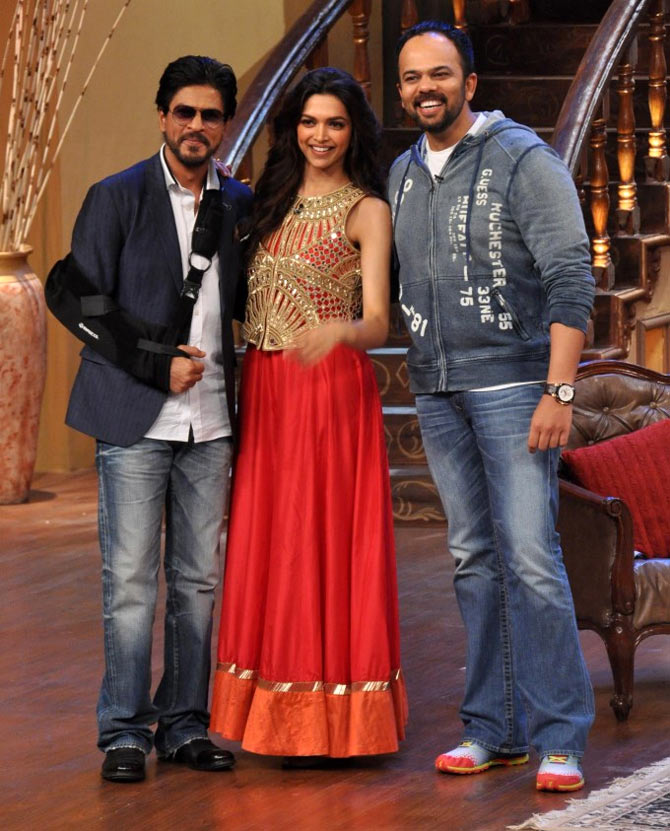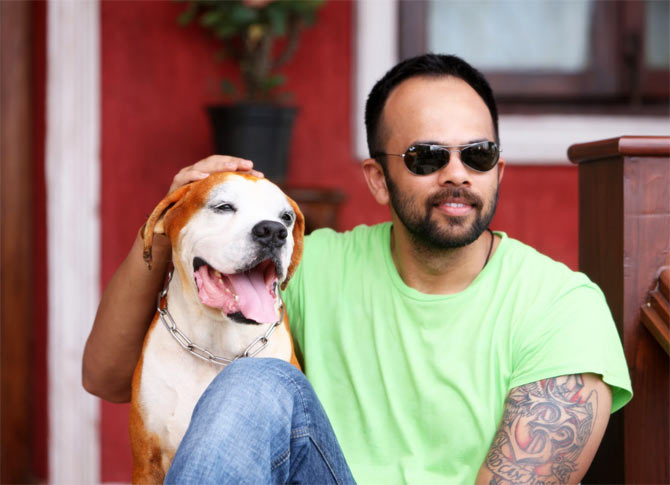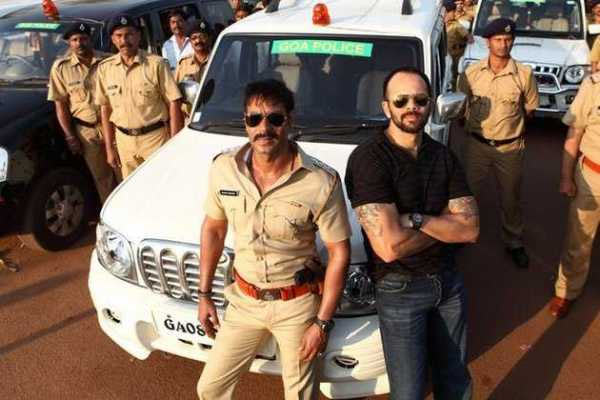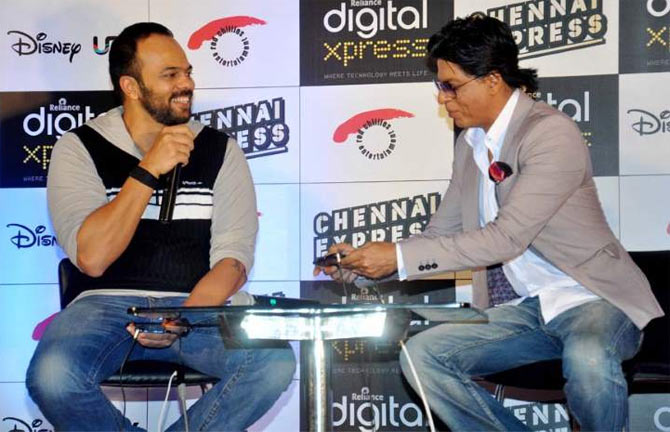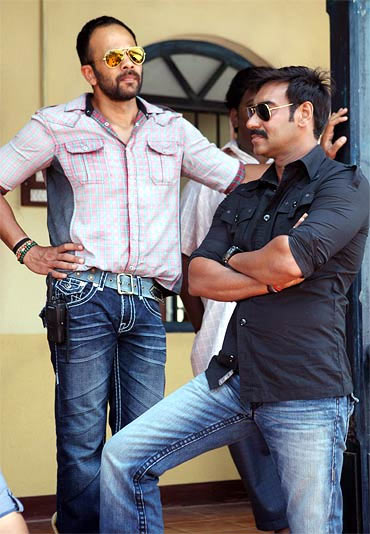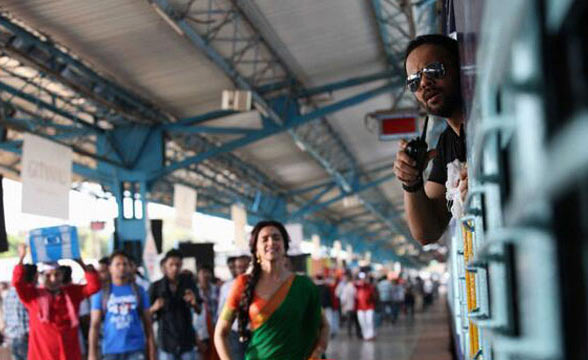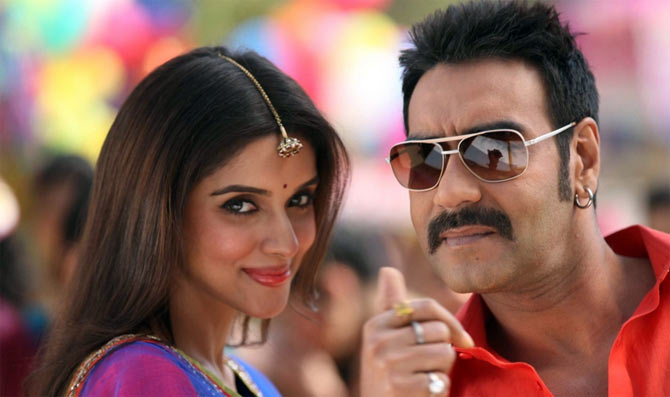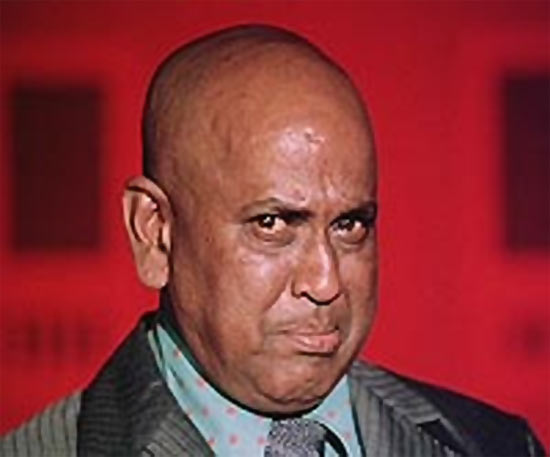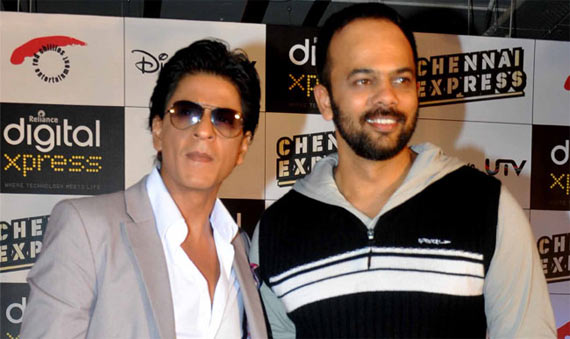 | « Back to article | Print this article |
Rohit Shetty: My first salary was Rs 35 a day
Outside the window, it was still dark. In the eternal battle between day and night, night was still the victor.
But, in his room in his grandmother’s house in Dahisar, a far-flung Mumbai suburb, a chubby 10-year-old had to open his drowzy eyes and get ready for school.
Still flushed with sleep, he would stumble through the morning routine.
Rohit Shetty knew he could not miss the 5.49 am Virar local train. Nearly an hour later, he would get off at Andheri, and board another train to Santa Cruz, which was still a couple of stations away.
At Santa Cruz, his little legs would climb a long flight of stairs that were still quite deserted. Walking eastwards, where the morning sun was spreading its warm light, he would descend an equally long flight of stairs to board a local bus that would take him to his school, St Mary’s, in Kalina.
The day his father died (Rohit’s father was actor and fight director Mudhu B Shetty, popularly known as Fighter Shetty), Rohit’s life -- and the life of his family -- changed for ever.
DON'T miss the first two parts of the interview with Rohit Shetty!
Part I: 'I don't make movies for intellectual people'
Part II: 'Shah Rukh and I were called the worst combination'
You went through very difficult times after your father passed away.
Yes.
Can you talk a little bit about it?
I think everybody has their story. I was in third or fourth when my mom had to start working because… (his father passed away.) Today, we are quite smart, we do our investments. Earlier, it was not like that.
My family went through a crisis.
'I never crib or cry'
How many siblings do you have?
I have three sisters, all elder to me. My mom had to look after everyone. There came a time we did not have a house to stay in. So we shifted to my granny's house.
She used to stay in Dahisar (a distant Mumbai suburb). My school was in Santa Cruz, as we used to live there earlier.
There were no good schools in Dahisar, so I remained at St Mary’s High School.
We had a house in Khar as well. Then everything had to be sold (laughs) and I had to travel one-and-a-half hours to reach school.
For the first three or four months, my mom came with me; then I told her I would go alone because she had to go to work. From the fifth standard to the tenth, I did that.
I was not a great student. If I went to college, I knew there would be additional expenses like fees and clothes. Where would we get the money for that?
Besides, I was interested in working. I wanted to become an action director or a director. So, after I completed my SSC, I started working.
Was the sudden change in lifestyle difficult to deal with?
Obviously, it was a shock. But I have always had a positive attitude. I never crib or cry. I never wonder why something (bad) is happening to me.
'Veeru Devgan was fond of me because he was my father's friend'
How did you get your entry into the film industry? There was a long gap from the time your father died to the time you entered the industry.
My eldest sister, Chanda, was an assistant director with Rahul Rawail. Kuku Kohli used to work with Rahul earlier.
She knew Kuku was directing a film and told him I wanted to assist him. But when we met, Kuku saw I was just 15 years old. It took me one-and-a-half years to convince him that I really wanted to work with him.
I used to go to his home everyday and he would say kal aana (come tomorrow), parson aana (come the day after). Aise karte karte, after one-and-a-half years, he called me and said, okay, you start working with me.
You were also in touch with Veeru Devgan.
Yes, he was doing the action for Kuku’s film. Veeruji knew my father very well; they were friends. He was fond of me because of that connection. He would take care of me. He has taught me a lot.
'When I see other directors who are more talented than me struggling, I feel fortunate'
What was your first salary?
Rs 35 per day. They used to give conveyance at that time.
There were also times when you would not get money.
By then, we had shifted from Dahisar to Evershine Nagar in Malad where we had taken a small house on rent.
I'm always guiding my driver through shortcuts in this area and sometimes he asks me, “Saab, aapko yeh sab galiyaan kaise maloom (How do you know all these narrow bylanes)?”
I don't tell him but, those days, there were many times when I did not have enough money. So I used to walk from Evershine Nagar to Natraj Studios (in Andheri). It used to take around two hours.
This would happen at least twice a week.
That's why I know what the masses are, that’s why I know what films to make (laughs).
So it has all come together for you.
Yes. I am grateful to God. Why should I crib about small things when He has given me so much?
When I look at my body of work or where I’ve reached, and see other directors who are more talented than me struggling, I feel fortunate.
You can't make everyone happy. People will talk about you. People will try and bring you down, but you have to keep working.
'There was a time in our lives when we needed money and my mother had gone to Mr Bachchan. He helped us'
Your sister got married last year and the entire industry turned up. How did that feel?
(laughs)
It must have made your mother very happy.
She was very proud of me that day. Even I felt good.
Mr Bachchan came. That was special for her.
There was a time in our lives when we required money and she had gone to Mr Bachchan since my dad had worked with him in many films. He helped us. He gave her money. I still remember that.
After the wedding, he wrote such a beautiful blog about my mother.
Most of them, especially Salman (Khan), Amitji and all the seniors, came because of my dad. And because of the kind of work I have done and because they have seen me through my struggle.
'I can't talk to Ajay Devgn like I talk to my friends or my juniors'
What kind of relationship do you share with Ajay Devgn?
It’s more than friendship. It’s like a family relationship. He treats me like a younger brother and I respect him like an elder brother.
He was the one who named my son Ishaan.
I can't talk to him like I talk to my friends or my juniors. It’s a father-friend kind of an equation, where there is more respect than anything else.
Do you see yourself making a film with Ajay and Kajol?
I should have a subject for that.
Chennai Express was an apt subject for Shah Rukh and me to come together.
Just like that, I need a great subject for Kajol, Ajay and me to come together.
I need to feel that this film, this story, this canvas can be made into an Ajay-Kajol film. The day I get that subject, I will do it.
Is that a goal?
No, you should never make a film that way. You should not plan a wall. You should lay the first brick.
'My son's six and quite filmi'
Your family refuses to step into the limelight...
Yes, it’s their choice and I respect it. They prefer their privacy. We are a very middle class family in that way.
How do they deal with the fact that you are a workaholic?
They are quite supportive.
Do you manage to spend time with them?
I do get a little bit of time. But I am into work at present and they have to understand that.
Does your son get upset because you are away on shoots for long spells?
I think he enjoys the fact that his dad is a director; he keeps telling everyone that he is Rohit Shetty’s son!
Ishaan’s six and quite filmi… much more than I am. He’s a bigger show off too (laughs).
I think he’s quite settled on his career choice -- he says he’s going to become an actor or a director when he grows up (smiles).
He should be happy in whatever he is doing - even if it is not related to the industry. I just want to him to be a good human being. I want him to be successful in life.
When he sees filmstars in the house, how does he react?
Ajay is like any other uncle and Kajol is like any other aunty for him.
He knows that they work with his dad but he does not get starstruck because of that.
'My mother keeps me grounded'
When you spend time with your wife or your mother, what do you do?
It’s the same kind of discussion, the same domestic issues that go on in every house.
I remember an incident that happened around the time Bol Bachchan was declared a big hit.
My mom was sitting next to me and she was irritated. “I told you to change the bulb, what happened?” she asked.
That brings me back to earth and keeps me grounded. I quietly told her I’d do it the next day.
Does she know that most of your films are part of the Rs 100 crore club?
She does not understand that number but she knows I have done well. It makes her doubly happy because she too is part of the industry.
Does the criticism about your work bother her?
Not really. She is not aware of it.
But if she sees a critical review of my work on television, she’ll tell me, “Arre, woh news channel wale ne aisa kyon bola? Phone kar usko.”
And I’m like, “Arre, mere naukar thodi hain woh. Use jo bolna hain, bolne do. Humein kya karna hai?”
“Par acchi toh film hai.”
“Woh aapko lagta hai na, use nahi lag raha hain na.”
'When Afghan and South Indian blood mix, you get a whacko like Rohit Shetty'
What language do you speak at home?
I speak Hindi. My mother is from Madhya Pradesh. My grandmother is from Afghanistan.
When Afghan and South Indian blood mix, then you get a whacko man like Rohit Shetty (laughs).
Do you know to speak Tulu (his father’s mother tongue and the language spoken by the Bunt community to which all Shettys belong)?
No. I want to learn to speak the language.
I am the youth icon for the Shettys; they've given me many awards including the Bunt Sangha youth icon award.
I go to so many functions (of the community) that I get embarrassed now.
At the moment, I cheat. Every year, I say I’ll definitely speak the language the next year. It’s high time I did.
'I am a very boring person'
Who are you like in real life? Who is Rohit Shetty?
A very boring person. You won’t see me socialising too much, because I don’t know what to say to people.
I love my work. I want to grow my company, expand it as much as I can.
I have seen so much sorrow; it’s a bad thing. I know that. That’s why I want to entertain as many people as I can; I want to see people smiling. I want to see the people I work with happy.
I don't like people trying to trash someone else. I want others to give me the same kind of respect I give them.
Don't try to analyse me; I’m a very simple man.
I want to be happy and I want to be left alone.
There comes a point in life where you get everything. Financially, you are secure. Your family is secure. You have the best of cars, you have a great office. What more can you want?
At the end of the day, all you have is 15 minutes of success. People will talk about you for 15 minutes, you know, that 50 years ago or 60 years ago there was this man.
But, yes, I like my privacy. If you don’t know about me, how can you talk about me?
I’m not out to harm anyone. I believe in Karma more than God. If I do wrong to anyone else, it will come back to me.
If I do something good for someone, that will also come back to me.
If everybody thinks from that point of view, everyone will be successful and happy.
Don't miss the first two parts of this interview!
Part I: 'I don't make movies for intellectual people'
Part II: 'Shah Rukh and I were called the worst combination'
